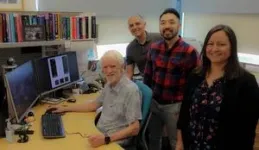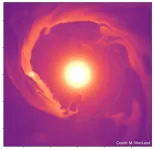(Press-News.org) EAST LANSING, Mich. – Backed by a $26 million federal grant, researchers at three Michigan universities, a leading health care system, and a state agency will continue a long-term study of how exposure to environmental factors during pregnancy and early childhood can impact health for a lifetime.
The funding from the National Institutes of Health, or NIH, is for the second phase of a national research program called ECHO, which stands for the Environmental Influences on Child Health Outcomes, and includes a sample of mothers, infants and children from across the United States. The first phase began in 2016.
“This award shows the research potential we have across the state,” said Jean Kerver, an associate professor of epidemiology and biostatistics at the Michigan State University College of Human Medicine and the lead principal investigator for the Michigan-based part of ECHO. “The partnership brings together some of the greatest research minds of our state. It’s definitely greater than the sum of its parts.”
In addition to MSU, the partners include the University of Michigan, Wayne State University, Henry Ford Health and the Michigan Department of Health and Human Services.
ECHO is not a single study but encompasses many research projects all over the country with the goal of improving the health of children as they grow into adults and for generations to come. The collaborative alliance of scientists in Michigan is called Child Health Advances from Research with Mothers, or CHARM. The goal of CHARM is to improve the health of mothers and children in Michigan.
The investigators study the health effects of a broad range of environmental exposures that occur during pregnancy and early childhood. That includes air pollution, chemical exposures and inadequate nutrition, as well as societal factors, such as stress and poverty.
Some of the child health outcomes studied include preterm birth, brain development and neurodevelopmental disorders, asthma and obesity.
Nationally, ECHO has collected data from 105,000 participants, including more than 64,000 children. In Michigan, the cohorts include more than1,500 pairs of mothers and their children enrolled through 11 hospitals and 21 prenatal clinics around the state. In this second phase, researchers plan to enroll 500 more pairs of mothers and children from the Detroit, Flint and Traverse City areas, Kerver said.
Kerver credited her predecessor as the lead principal investigator, Nigel Paneth, with forming the statewide partnerships. Although retired from a full-time faculty position, Paneth, an emeritus University Distinguished Professor of epidemiology and biostatistics and pediatrics and human development at the MSU College of Human Medicine, remains active in the ECHO program and other research.
Charles Barone, a pediatrician at Henry Ford Health, has been key in maintaining clinical and stakeholder relationships.
“It's both important and gratifying to receive such a strong commitment from the NIH in support of our affiliated Michigan institutions continuing to build upon the success of the ECHO program for an additional seven years,” said Barone. “This research helps us to better understand how environmental factors affect child health from birth through adolescence, and what can be done to mitigate and improve their health outcomes for generations to come.”
Michael Elliott, professor of biostatistics at U-M, developed the hospital and prenatal clinic sampling plan that ensures results are representative of all births in the Lower Peninsula of Michigan.
"This new grant will allow us to continue following our representative sample of Michigan births through infancy and childhood to assess how prenatal factors affect child health, pointing to ways to improve child health from birth on," Elliott said. "We will also leverage the relationships we developed at sampled hospitals in Detroit, Flint and Traverse City to continue recruiting mothers and babies in minority, low-income and rural communities, all areas at greater risk of poor child health. My work and the work of other researchers at the University of Michigan will be integral to these efforts."
Douglas Ruden, a professor and director of epigenomics at Wayne State University’s Institute of Environmental Health Sciences, is joined by experts in immunology and toxicologists who study environmental exposures to both the mother and father.
“The second Michigan ECHO grant is a tremendous opportunity to understand how a mother’s exposure to environmental chemicals and stressors affects the health of her children,” said Ruden. “This important alliance will impact the health of many around the U.S., now and into the future.”
Kerver said she was excited when she learned that the NIH approved funding for the Michigan partners in the ECHO program. Some of the findings, she said, could immediately lead to better health for Michigan residents.
“It absolutely should,” she said. “What we hope to do is solve health problems people in Michigan and across the U.S. have right now. That is the main thing. That’s what we’re all working for.”
MEDIA CONTACTS
Geri Kelley, Michigan State University, 616-350-7976, kelleyg3@msu.edu
Jeffrey Adkins, Henry Ford Health, 586-307-2027, jadkins6@hfhs.org
Kim North Shine, University of Michigan, 313-549-4995, kshine@umich.edu
Julie O’Connor, Wayne State University, 313-577-8845, julie.oconnor@wayne.edu
Lynn Sutfin, MDHHS, 517-284-4772, SutfinL1@michigan.gov
By Pat Shellenbarger.
Read on MSUToday.
###
Michigan State University has been advancing the common good with uncommon will for more than 165 years. One of the world's leading research universities, MSU pushes the boundaries of discovery to make a better, safer, healthier world for all while providing life-changing opportunities to a diverse and inclusive academic community through more than 400 programs of study in 17 degree-granting colleges.
For MSU news on the Web, go to MSUToday. Follow MSU News on Twitter at twitter.com/MSUnews.
END
$26M NIH grant addresses environmental influences on child health
MSU, Henry Ford Health, University of Michigan, Wayne State University, and Michigan Department of Health and Human Services collaborate on statewide initiative
2023-09-01
ELSE PRESS RELEASES FROM THIS DATE:
LDL not the be all, end all in heart disease, heart attacks and stroke
2023-09-01
Milwaukee, Wis. – Sept. 1, 2023 – Despite advances in treatment for high cholesterol, heart disease remains the leading cause of death in the U.S. Scientists at the Medical College of Wisconsin (MCW) are investigating the role of a form of cholesterol called very-low-density lipoprotein – and their findings may lead to new treatment options in the future.
The research team is led by Ze Zheng, MBBS, PhD, MCW assistant professor of medicine (endocrinology and molecular medicine); co-leader of the MCW Cardiovascular Center’s Atherosclerosis, Thrombosis ...
Hot Jupiter blows its top
2023-09-01
A planet about 950 light years from Earth could be the Looney Tunes’ Yosemite Sam equivalent of planets, blowing its atmospheric ‘top’ in spectacular fashion.
The planet called HAT-P-32b is losing so much of its atmospheric helium that the trailing gas tails are among the largest structures yet known of an exoplanet, a planet outside our solar system, according to observations by astronomers.
Three-dimensional (3D) simulations on the Stampede2 supercomputer of the Texas Advanced Computing Center (TACC) helped model the flow of the planet’s atmosphere, ...
Kidder receives American Chemical Society’s 2023 Mid-Career Award
2023-09-01
Michelle Kidder, a senior R&D staff scientist at the Department of Energy’s Oak Ridge National Laboratory, has received the American Chemical Society’s Energy and Fuels Division’s Mid-Career Award for sustained and distinguished contributions to the field of energy and fuel chemistry. She was recognized for her scientific community service, leadership and contributions. Her research focuses on novel material development, methods and advanced characterizations for the separation and reaction chemistry of renewable energy resources including lignin and carbon dioxide.
Kidder, ...
Mukherjee elevated to senior member of IEEE
2023-09-01
Subho Mukherjee, an R&D associate in the Vehicle Power Electronics Research group at the Department of Energy’s Oak Ridge National Laboratory, has been elevated to the grade of senior member of the Institute of Electrical and Electronics Engineers, or IEEE. Senior IEEE members have made significant contributions to the profession and worked in the engineering field for 10 years or more.
As an electrical engineer, Mukherjee focuses on wireless power charging and developing wide bandgap semiconductor-based ...
SMART-BARN – a cutting-edge technology lab to study animal groups
2023-09-01
Researchers from the Cluster of Excellence Centre for the Advanced Study of Collective Behaviour (CASCB) and the Max Planck Institute of Animal Behavior have converted a former barn into a cutting-edge technology lab for complex behavioral analysis. In it, they can now study the intricate behaviour of animal groups. The barn also served as a prototype for the largest swarm behaviour lab at the University of Konstanz: the Imaging Hangar.
A major limitation in behavioural research is that scientists can either study animals under highly-controlled, yet often unrealistically simplified and ...
Immune cells shape their own path
2023-09-01
When fighting disease, our immune cells need to reach their target quickly. Researchers at the Institute of Science and Technology Austria (ISTA) now discovered that immune cells actively generate their own guidance system to navigate through complex environments. This challenges earlier notions about these movements. The researchers’ findings, published in the journal Science Immunology, enhance our knowledge of the immune system and offer potential new approaches to improve human immune ...
Network-based approaches open a new avenue to classify and treat rare diseases
2023-09-01
Scientists at CeMM, Max Perutz Labs, and St. Anna Children’s Cancer Research Institute in Vienna have achieved a significant advancement in the research of rare immune system disorders. Through a network-based approach, they have reclassified approximately 200 rare diseases. Initial comparisons with clinical data already demonstrate how this can enhance the prediction of treatment efficacy. Moreover, the study reveals for the first time the strong similarities between the molecular mechanisms of rare diseases and ...
Warming climate worsens groundwater depletion rates in India
2023-09-01
Increased withdrawals of groundwater resources are accelerating groundwater depletion rates in India, a groundwater depletion hotspot, a new study finds. The study, published today in the journal Science Advances, is led by University of Oklahoma Department of Geography and Environmental Sustainability assistant professor Nishan Bhattarai.
Bhattarai and his collaborators found that under a business-as-usual scenario of groundwater use for irrigation, warming may triple the groundwater depletion rates. Approximately 60% of India’s irrigated agriculture depends on the threatened groundwater. The results of the study indicate that adaptation ...
Groundwater depletion rates in India could triple in coming decades as climate warms, study shows
2023-09-01
EMBARGOED FOR RELEASE AT 2 P.M. ET FRIDAY, SEPT. 1, 2023
Photos
ANN ARBOR—A new University of Michigan-led study finds that farmers in India have adapted to warming temperatures by intensifying the withdrawal of groundwater used for irrigation. If the trend continues, the rate of groundwater loss could triple by 2080, further threatening India's food and water security.
Reduced water availability in India due to groundwater depletion and climate change could threaten the livelihoods of more than one-third of the country's 1.4 billion ...
Toxic molds, fossil fuels, antibiotics linked to chemical intolerance: Survey
2023-09-01
SAN ANTONIO (Sept. 1, 2023) — What initiates chemical intolerance (CI)? In a newly released survey of thousands of U.S. adults, respondents most frequently cited exposures to biological sources, such as mold and algae “blooms,” and/or fossil fuels, their combustion products and synthetic chemical derivatives such as pesticides, plastics and persistent organic pollutants.
It's an issue in the news, as toxic mold spawned by the moisture left behind by flood waters from Hurricane ...
LAST 30 PRESS RELEASES:
Scientists show how to predict world’s deadly scorpion hotspots
ASU researchers to lead AAAS panel on water insecurity in the United States
ASU professor Anne Stone to present at AAAS Conference in Phoenix on ancient origins of modern disease
Proposals for exploring viruses and skin as the next experimental quantum frontiers share US$30,000 science award
ASU researchers showcase scalable tech solutions for older adults living alone with cognitive decline at AAAS 2026
Scientists identify smooth regional trends in fruit fly survival strategies
Antipathy toward snakes? Your parents likely talked you into that at an early age
Sylvester Cancer Tip Sheet for Feb. 2026
Online exposure to medical misinformation concentrated among older adults
Telehealth improves access to genetic services for adult survivors of childhood cancers
Outdated mortality benchmarks risk missing early signs of famine and delay recognizing mass starvation
Newly discovered bacterium converts carbon dioxide into chemicals using electricity
Flipping and reversing mini-proteins could improve disease treatment
Scientists reveal major hidden source of atmospheric nitrogen pollution in fragile lake basin
Biochar emerges as a powerful tool for soil carbon neutrality and climate mitigation
Tiny cell messengers show big promise for safer protein and gene delivery
AMS releases statement regarding the decision to rescind EPA’s 2009 Endangerment Finding
Parents’ alcohol and drug use influences their children’s consumption, research shows
Modular assembly of chiral nitrogen-bridged rings achieved by palladium-catalyzed diastereoselective and enantioselective cascade cyclization reactions
Promoting civic engagement
AMS Science Preview: Hurricane slowdown, school snow days
Deforestation in the Amazon raises the surface temperature by 3 °C during the dry season
Model more accurately maps the impact of frost on corn crops
How did humans develop sharp vision? Lab-grown retinas show likely answer
Sour grapes? Taste, experience of sour foods depends on individual consumer
At AAAS, professor Krystal Tsosie argues the future of science must be Indigenous-led
From the lab to the living room: Decoding Parkinson’s patients movements in the real world
Research advances in porous materials, as highlighted in the 2025 Nobel Prize in Chemistry
Sally C. Morton, executive vice president of ASU Knowledge Enterprise, presents a bold and practical framework for moving research from discovery to real-world impact
Biochemical parameters in patients with diabetic nephropathy versus individuals with diabetes alone, non-diabetic nephropathy, and healthy controls
[Press-News.org] $26M NIH grant addresses environmental influences on child healthMSU, Henry Ford Health, University of Michigan, Wayne State University, and Michigan Department of Health and Human Services collaborate on statewide initiative









